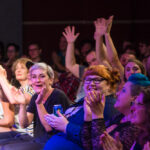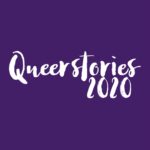This article appeared in the Star Observer on 4 October 2013.
My Facebook feed, dominated by queers, has been quick to share parodies and outraged blog posts about Robin Thicke’s Blurred Lines. But where is the outrage when it comes to the ‘blurred lines’ in our own community, namely the appalling way we tend to deal with sexual harassment?
A few years ago I was at the pub, sat against the wall, sandwiched between a few drunk mates. An acquaintance suddenly interrupted our conversation to point out – shock horror – that I was wearing a skirt. Perhaps she’d never seen a lez in a skirt before, so she didn’t know the appropriate response – quiet admiration; a polite compliment; a query as to the outlet that sold such a lovely skirt? All appropriate.
Instead she repeatedly and insistently tried put her hands up my skirt and touch my thighs, despite me firmly and clearly telling her to stop, several times. It all happened really quickly and I was so taken aback it took me a little while to get my friends to move from their seats so I could get away. She apologized profusely the next day – once sober. But, if she had been a man, my friends would have gone completely ballistic.
Now, I’m not having a go at this woman in particular or at my friends. I’ve heard many tales like mine of lesbians sexually harassing each other in ways that would be considered abhorrent – indeed illegal – if committed by a man.
These ‘blurred lines’ allow for a culture of confusion among our community around what constitutes harassment, assault, rape or domestic violence when two women are involved. This culture can stop the individual who has been the victim of the harassment from coming to terms with what’s taken place, questioning their own involvement in the incident, feeling the exact way we tell victims of heterosexual assault they shouldn’t feel – guilty and dismissed.
Perhaps we don’t see it as sexually threatening when one woman assaults another because the perpetrator and victim could be physically evenly matched. Perhaps we find it hard to define consent because friendships between women are often physically affectionate, making it difficult to say what constitutes crossing the line. But most significantly and sobering for all of us is acknowledging the challenge of calling out this sort of behaviour in a community that already suffers such discrimination from the outside – admitting our flaws feels like giving ammunition to the homophobes. But none of these explanations, especially the last, is a reason or excuse valid enough to be worth silencing the victims.
Organisations like the Inner City Legal Centre and ACON are doing all they can to provide education on these issues, but we need a community effort to change our culture. We need individuals to speak out when they see these incidents take place and we need to always remember that this behaviour is unacceptable regardless of the gender of the perpetrator.
If you have been the victim of sexual harassment, assault or domestic violence, the following links may be of assistance:
















